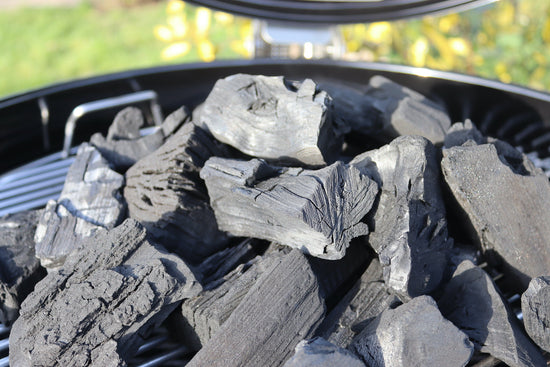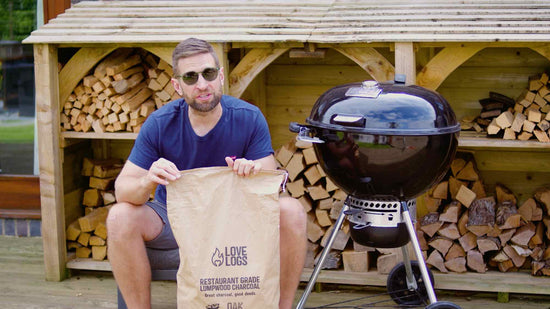

You've bought the best cuts of meat from your butcher, perfected your rub recipes and practiced chargrilling those veggies to perfection. So why are you still using cheap, chemical covered, imported charcoal to cook it on?
We think that the charcoal you use is one of the most important ingredients in your BBQ, and you can drastically improve both your enjoyment of the cook and the taste of the food by using good quality, British charcoal.
Did you know that a staggering $58 million worth of charcoal was imported to the UK in 2021, around 95% of our total consumption - the majority from African or South American countries with no checks or certifications to guarantee that it was taken sustainably?
Admittedly, British is charcoal is a little more expensive than cheaper, imported brands - but it's one of those products that shouldn't be a race to the bottom on price.
That said, we truly believe British charcoal gives you a much better BBQ experience as well as being better for the planet. Here's why.
Jump to:
British charcoal is free from chemicals
Charcoal which has been made in a retort from pure British hardwood lights easily and burns hot so there's no need to chemical accelerants.
Love Logs British charcoal is 'restaurant grade' which means there are no additives or binders - it's purely hardwood which has been turned into very high purity charcoal. It's clean enough to cook right on the coals and you don't need to wait for it to 'ash over' before you can use it - because letting your charcoal "ash over" is just marketing speak for letting the chemicals burn off!
It gives off a small amount of 'clean' smoke, which adds a subtle smoky flavour to your food; for even more flavour, combine it with Smoking Wood Chunks to elevate your cooks to the next level.
Imported charcoal is a different story. As there's so much variation in the quality and species of woods in imported charcoal, you can get a different experience even from the same brand - it can be difficult to light and burn, and can smoke or spit. Unless, of course, you buy those 'Easy Light' bags which come already covered in lighter-fluid type chemicals just so you can get it going.
With very little regulation within the industry, many imported charcoal briquettes are also mixed with sawdust so they give off an acrid, dark smoke - why would you want to cook with that?
In truth, it's difficult to know exactly which chemicals are in most big brand name charcoals because there's so little transparency and regulation.
If the charcoal seller doesn't proudly declare that their charcoal is additive free, it might be worth asking exactly what's in it before using it to cook your food!
British Charcoal is less prone to breakage
Charcoal from Africa travels 3,000 - 4,000 miles to get to the UK. Charcoal from Brazil travels over 5,000 miles to get to the UK. Along the way it will change hands multiple times between producer, exporter, importer, re-seller etc. Every time charcoal is handled, it's at risk of breakage.
Love Logs charcoal generally travels around 20 miles to get the distribution centre in the UK, and changes hands once - from the producer to the courier.
This gives comparable products two wildly different carbon footprints and also means British charcoal is less prone to breakage and powdering along the way - your lumpwood stays as proper lumps!

British charcoal doesn't contribute to deforestation
Did you know that around 75% of the world’s charcoal comes from Africa or Brazil where it is fuelling serious deforestation?
In Tanzania alone, over 469,000 hectares were lost to deforestation in the 5 years between 2015 and 2020, and in Brazil, trees are illegally cut from the Amazon to fuel the charcoal trade.
The UK has strict laws about sustainable forestry so buying British charcoal from a legitimate business means it has been properly sourced and isn't contributing to deforestation.
Love Logs charcoal is sourced from professionally and sustainably managed woodland in Herefordshire, generally within 20 miles of the production and dispatch site.

British charcoal production is more environmentally friendly
Much of the charcoal in tropical countries is commonly made in traditional earth and pit kilns with a wood-to-charcoal conversion rate of about 20%.
Earth and pit kilns are bad for the environment. The wood is left to smoulder and smoke for a few days, releasing CO2 which is bad for air quality, and tar is allowed to soak into the ground, which is bad for the soil.
Our lumpwood charcoal is produced in a wood-burning retort which is a large barrel shaped kiln which converts wood into charcoal using a process called pyrolysis. A retort contains a chamber for the wood to be charcoaled, and a separate ‘fire box’ used as a heat source, allowing the wood to be heated indirectly to extremely high temperatures without being exposed to oxygen - so it never catches fire.
The retort is a more environmentally friendly way of producing charcoal as it burns up to 95% of the smoke it produces rather than releasing particulates into the air like the traditional method. It also holds the tar in the bottom of the chamber, preventing pollution in the soil.

British charcoal supports local jobs and economies
Nearly all British charcoal sellers are like Love Logs - independent, small businesses, creating a great product that they're proud to put their name to.
They buy local wood and hire local people to make a product which is then sold in the UK, giving back to local economies and directly impacting sustainable UK forestry.
This is in huge contrast to Brazil, where there have been hundreds of documented cases of abuse of workers and even 'slave labour' conditions for the people forced to work felling trees and producing charcoal. We choose not to support an industry like that.
How do I know if my charcoal is British?
The supplier will make it obvious!
We at Love Logs are proud to sell British charcoal and happily shout about it in our packaging, on our website and via our social media.
Legally though, charcoal doesn't need to be labelled with where it's come from so companies bringing charcoal in from Brazil or Africa generally avoid advertising that fact to their customers.
If your supplier doesn't proactively tell you where your charcoal is from, it's probably because they don't want you to know!
If you buy your charcoal from a supermarket in a plastic bag, it's almost certainly come from a place where production and labour costs are cheap enough to offset the cost of shipping it thousands of miles.
Found this useful?
We'd love it if you shared it with your fellow BBQ enthusiasts!




